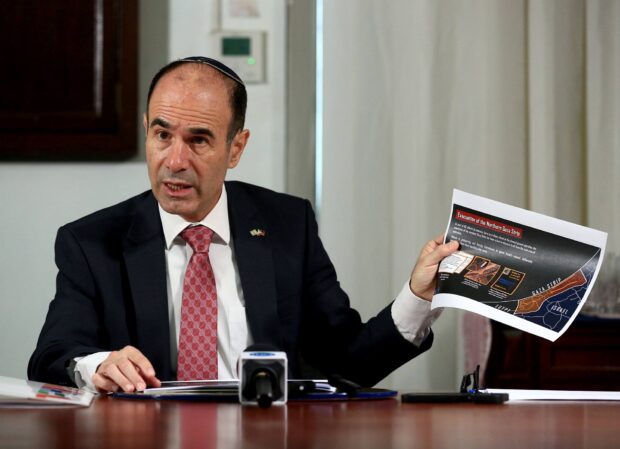
CRISIS BRIEFING Israel Ambassador to the Philippines Ilan Fluss briefs editors and staff of the Philippine Daily Inquirer about the Israel-Hamas conflict during a visit to the paper’s office in Makati City on Tuesday. —RICHARD A. REYES
MANILA, Philippines — Israel “recognizes and appreciates” the Philippine government’s decision to abstain from voting on the “pro-Palestine” United Nations General Assembly resolution last week, Tel Aviv’s Ambassador to Manila Ilan Fluss said on Tuesday.
In an interview during his visit to the Inquirer office, Fluss said there were a lot of “important principles” to the Philippines and Israel that were missing from the resolution calling for a truce between Israel and the Palestinian militant group Hamas.
“We do recognize and appreciate the abstention of the Philippine government and it was explained that there was no mention of the terror attack of Hamas on Israel which led to Israel deciding to attack Hamas,” Fluss pointed out.
“These were very basic elements which had to be there. Of course, there’s no mentioning of the hostages which for us was extremely important and so a lot of the language was, generally speaking, pro-Palestinian and undermining the Israeli interest,” Fluss added.
The diplomat was referring to the Oct. 7 assault by the Palestinian armed group on Israeli areas near the Gaza Strip, bombing civilian infrastructure and shooting and killing civilians.
Israel said at least 1,400 Israelis perished in the attacks, including four Filipinos and other foreign nationals.
Israeli forces countered by unleashing unrelenting airstrikes into the densely populated Gaza Strip with the aim of eradicating Hamas forces.
The Hamas-controlled Gaza Health Ministry said the death toll among Palestinians had passed 8,000, as Israeli tanks and soldiers pursued what Israeli Prime Minister Benjamin Netanyahu termed a “second stage” in the war ignited by Hamas’ brutal Oct. 7 attack.
Lack of ‘factual information’
Tel Aviv was also infuriated when the UN resolution did not recognize Israel’s narrative of “right to self-defense” that was triggered by the Hamas assault.
Fluss explained that efforts led by Canada to include these elements in the UN resolution were supported by 88 countries, but this fell short by eight votes for these to be included.
If Canada’s efforts to add more “factual information” of the Oct. 7 attack and a “condemnation” of it were included in the resolution, the Philippines would have had voted in favor of it, the Department of Foreign Affairs (DFA) explained last week right after the voting.
The Philippine government also recognized Israel’s right to self-defense.
The DFA highlighted that the Hamas attack had already killed four overseas Filipino workers (OFWs) in Israel, while Fluss suspected that the two missing OFWs were among the 230 hostages taken by Hamas into Gaza.
“The UN resolution adopted on Oct. 28 called an “immediate humanitarian truce” leading to the “cessation of hostilities,” the assurance of the safe passage of humanitarian aid into Palestine, and the “immediate and unconditional release of all civilians who are being illegally held captive” but it did not specifically mention the hostages taken by Hamas.
The resolution did condemn the “acts of terrorism and indiscriminate attacks” against civilians but only expressed “grave concern” over the “latest escalation of violence” that started with Hamas’ Oct. 7 attack.
A total of 120 countries voted in favor of the resolution, while 14 others were against it. The Philippines was one of the 45 countries that abstained, along with Ukraine, Australia and China.
“The UN has a lot of Israeli resolutions that take the Palestine narrative and not the state of Israel narrative,” Fluss lamented.
Israel has also been at the receiving end of criticism of mostly Islamic countries, reminding that Israel was recognized by the UN as an occupying power in the Gaza Strip due to its blockade of the country’s territory.
Calls for a “humanitarian truce” to get badly needed food, water, medicine, and fuel to the 2.3 million people in Gaza have been triggered by the rising death toll and destruction in the Palestinian territory.